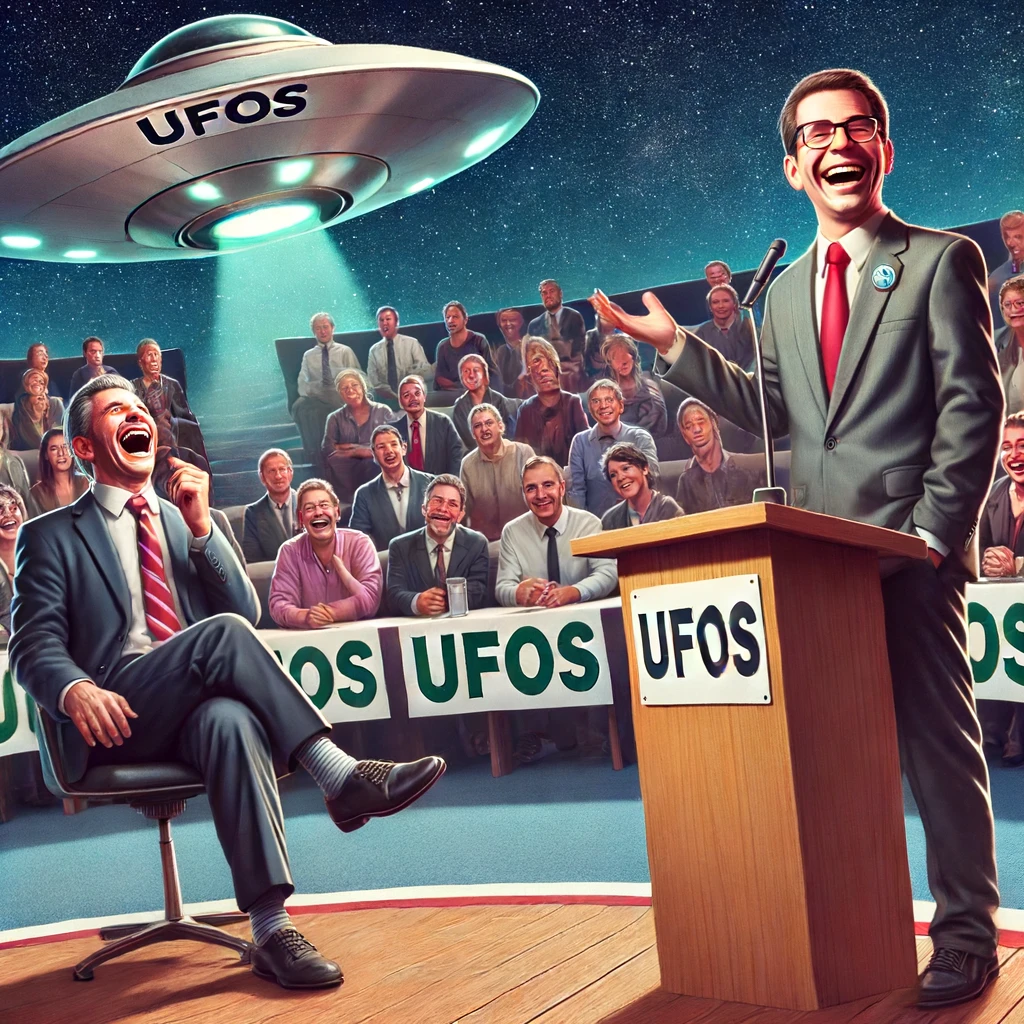Mocking the Unknown: The Dismissive Attitude Towards UFOs in Politics

During a recent event, Chris Christie pledged to “level” with the American people about the truth regarding UFOs, eliciting laughter from the audience, Fox hosts, and Christie himself. This reaction from Fox, mocking such a crucial topic being discussed in Congress, is indeed a shame. UFOs interrupting our nuclear military defenses is no laughing matter, and this dismissive attitude is likely to age poorly.
The crowd’s ignorance highlights a broader issue: the average person’s attention span is so short that, despite numerous hearings and ample evidence from radar and FLIR backing up credible sightings by Top Gun pilots, they remain uninformed and continue to stigmatize the topic. Christie’s laughter is particularly jarring considering over 20 US Congress members are taking the issue seriously. One would think that this level of attention might prompt some to dig deeper into the matter. Treating UFOs as a joke undermines national security concerns, and the departure of Tucker Carlson, who often discussed such issues, seems even more unfortunate in this context. It’s clear that anyone who dismisses UFOs so flippantly should reconsider their stance on such a critical issue.
According to an article from Fox News, UFOs soar from taboo to presidential time: It’s time to inject UAPs into elections, institute says, the conversation around UFOs, now often referred to as Unidentified Aerial Phenomena (UAPs), is becoming increasingly significant in politics. The article notes that the taboo surrounding UFO discussions is dissipating, with more serious attention being given to the topic by lawmakers and presidential candidates. As these phenomena are reportedly being injected into electoral discussions, the Institute for Security and Technology suggests that it is time for presidential candidates to address UAPs transparently.
The skepticism and ridicule that greeted Christie’s statement are indicative of a broader societal reluctance to engage with the topic seriously. This reluctance persists despite credible reports and evidence from military sources and respected pilots. For instance, the Pentagon has confirmed the existence of a dedicated UAP Task Force, and recent Congressional hearings have underscored the potential national security implications of UAPs. The stigma and jokes are not just about public ignorance; they reflect a deeper cultural bias that hinders open and serious discussions.
Christie’s promise to be transparent about UAPs if elected aligns with a growing demand for government accountability and disclosure. The laughter and jokes at our expense underscore the difficulty of changing public perception, but they also highlight the importance of leadership that is willing to confront uncomfortable truths. The fact that over 20 Congress members are taking the issue seriously should serve as a wake-up call to the general public and media alike.
Historically there has been varied perspectives of U.S. presidents on UFOs. It covers how different leaders, including Biden, Trump, Reagan, Nixon, Carter, Kennedy, and Eisenhower, have engaged with the topic. From Biden’s focus on national security to Reagan’s public speeches about alien threats uniting humanity, each president’s approach adds to the intrigue. Notably, Eisenhower’s alleged secret meetings with extraterrestrials and Nixon’s purported sharing of alien evidence with Jackie Gleason are highlighted as significant points of interest.
Biden vs. Trump: The Battle for Alien Disclosure in the 2024 Election looks into how the issue of Unidentified Aerial Phenomena (UAPs) might influence the upcoming presidential election. It highlights the contrasting approaches of Joe Biden and Donald Trump toward UAP disclosure, with Trump having shown more openness during his term, while Biden has been more cautious. The article suggests that UAPs could become a wedge issue, potentially swaying voter behavior and shaping the political landscape as calls for transparency increase.
This is not merely a matter of curiosity or entertainment; it’s a serious national security issue that warrants serious consideration and discussion. The mocking laughter from Fox hosts and the audience diminishes the gravity of a topic that involves the potential disruption of nuclear military defenses. Such a response is not only dismissive but also dangerous, as it perpetuates ignorance and stigmatization of an issue that has far-reaching implications.

